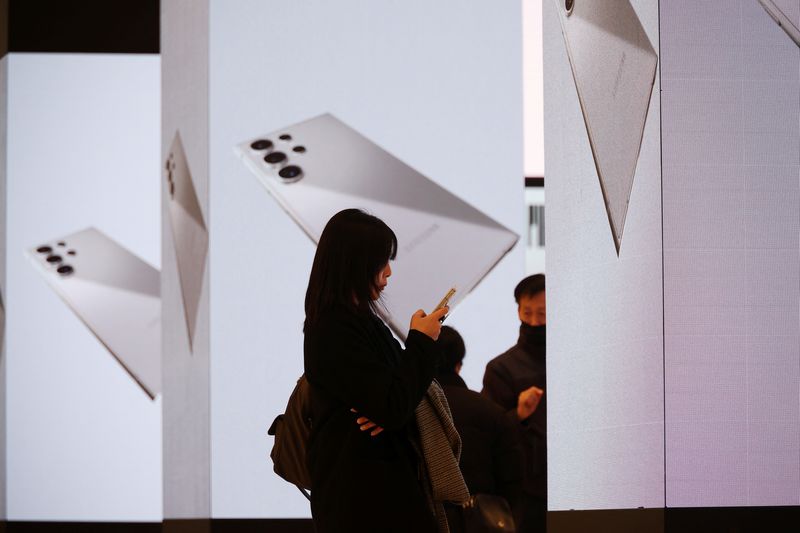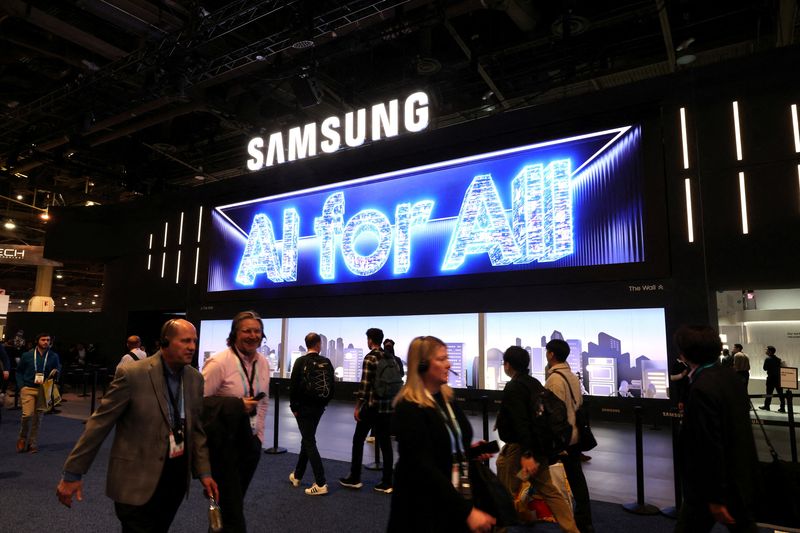By Heekyong Yang and Hyunjoo Jin
SEOUL (Reuters) -Samsung Electronics said it would focus on producing high-end chips and was making progress on a major supply deal, as it sought to allay investor concerns over its semiconductor business that suffered a 40% quarter-on-quarter profit plunge.
The comments by an executive on an earnings call helped lift Samsung (KS:005930) shares more than 3% on Thursday, reversing earlier losses. The stock has been one of the worst performers among major chipmakers this year, losing nearly a quarter of its value, as the South Korean firm has struggled to catch up with rivals TSMC and SK Hynix that posted record third-quarter earnings on the back of the artificial intelligence boom.
"While there was a delay in commercialising HBM3E sales as we had flagged earlier, we have made meaningful progress in the product's qualification test process with a major customer," Samsung Executive Vice President Jaejune Kim told analysts, referring to high-end memory chips used to make AI chipsets.
"As a result, we expect improved (HBM3E) sales in the fourth quarter and plan to expand sales to multiple customers."
It did not disclose the major client, but analysts have said the qualification test has been conducted by Nvidia (NASDAQ:NVDA), which controls around 80% of the global AI chip market.
Reuters also reported earlier that Samsung's HBM3E chips had passed Nvidia's tests for use in the U.S. firm's processors.
"Samsung's comments ...suggest that the company is expected to finally supply HBM3E chips to Nvidia, clearing a major hurdle in its HBM business," said Ryu Young-ho, a senior analyst at NH Investment & Securities.
Shares in SK Hynix tumbled as much as 4.6% on Thursday, hit by concerns of HBM chip oversupply following Samsung's comments.
Artificial intelligence is the only bright spot in the sluggish chip market, but Samsung has been struggling to supply high-end semiconductors used in AI chipsets, making it more vulnerable to lacklustre demand for traditional chips used in PCs and smartphones.
"In the fourth quarter, while memory (chip) demand for mobile and PC may encounter softness, growth in AI will keep demand at robust levels," Samsung said in an earnings statement.
"Against this backdrop, the Company will concentrate on driving sales of High Bandwidth (NASDAQ:BAND) Memory (HBM) and high-density products," it said.
The world's biggest maker of memory chips, smartphones and TVs also warned on Thursday of limited earnings growth in the current quarter due to intensifying competition in the consumer electronics segment during the peak year-end demand season.
Samsung posted an operating profit of 9.2 trillion won ($6.66 billion) in the July to September period, compared with 2.4 trillion won a year earlier and 10.4 trillion won the previous quarter.
The third-quarter result was slightly above Samsung's preliminary estimate of 9.1 trillion won flagged earlier this month, which was below market expectations at the time.
Samsung this month made a rare apology for its disappointing earnings, citing "delays" in sales of its advanced chips and rising supply of traditional chips from Chinese rivals.
SLOW CHIP RECOVERY
Samsung's chip division swung to an operating profit of 3.9 trillion won in the third quarter from a loss of 3.8 trillion won a year earlier, but that was down from 6.45 trillion won the preceding quarter.
Samsung said its chip earnings were hurt by one-off expenses such as the provision of employee incentives, and currency effects due to a weak dollar.
"Samsung hasn't commercialised HBM as effectively as its competitors, so its third-quarter performance and fourth-quarter outlook are falling short of market expectations," said Baik Gil-hyun, analyst at Yuanta Securities.
"It's anticipated that it will take some time before the business performs as expected."
SK Hynix had posted a record third-quarter operating profit of 7 trillion won, thanks to AI chip sales to Nvidia.
Samsung is struggling to compete against rivals not only in its mainstay memory chip business, but also in its foundry business that designs and produces logic chips for other clients. Analysts say Samsung's logic chip business suffered from widening losses in the third quarter.
The company has postponed taking deliveries of ASML (AS:ASML)'s high-end chipmaking equipment for its upcoming factory in Texas as it has yet to win any major customers for the project, sources previously told Reuters.

Samsung's mobile devices business also saw its third-quarter operating profit dropping to 2.8 trillion won from 3.3 trillion won a year earlier.
($1 = 1,380.3900 won)
